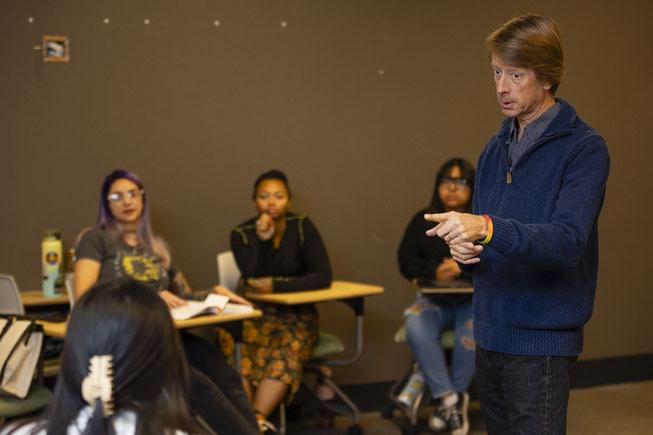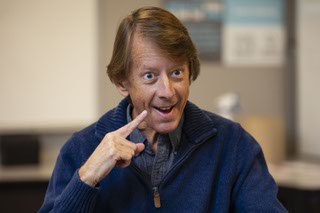
David Kelsey, lecturer of Deaf Studies, right, speaks with sign language while he teaches students during a class at Nevada State University in Henderson Wednesday, Nov. 8, 2023.
Monday, Nov. 13, 2023 | 2 a.m.
When Honey Houston began her job at Amazon, she was surprised to learn that a few of her coworkers were deaf.
Houston found herself entranced by the quick movements of the two sign language interpreters who would show up to help her deaf coworkers during employee meetings.
It was the spark Houston needed to enter the deaf studies program at Nevada State University, where she’s working toward a degree to help curb a national shortage of interpreters for the deaf community.
“I really thought I could do that; obviously I need to study and learn, but I could do that and that looks like so much fun,” Houston said. “(American Sign Language) and interpreting, for sure, it really opened my eyes to a brand new world.”
Since 2017, Nevada State University has offered students a bachelor of arts degree in deaf studies and a minor in deaf studies or ASL interpreting, said David Kelsey, lecturer of deaf studies. The minor was established two years earlier, but Kelsey said students pushed for a major with more curriculum to be created.
Through the major, students have more opportunities to become interpreters, connect with the deaf community and become allies, Kelsey said. It also serves as a pipeline for Southern Nevada’s workforce of interpreters, which has “always had an inadequate supply” but suffered even more following the pandemic.
Roughly 500,000 people are considered deaf or hard of hearing and use American Sign Language in the United States, according to the National Census of the Deaf Population.
Hearing loss can be caused by several factors and occurs on a scale ranging from mild to severe, while deafness mostly implies very little or no hearing, the World Health Organization said. It is estimated that over 700 million people, or 1 in every 10, will have disabling hearing loss by 2050.
The United States has almost 10,000 certified interpreters on the Registry of Interpreters for the Deaf, according to the organization’s website. Nevada has only 80.
The interpreter shortage has affected a variety of people in many different settings. In 2022, the National Deaf Center on Postsecondary Outcomes said the shortage of interpreters “has been especially challenging” and caused a “crisis for deaf college students.”
Elementary, middle and high schools — including the Clark County School District — have also seen a lack of interpreters able to serve their students’ needs, Kelsey said.
But it isn’t limited to just academic settings.
Kelsey, who is deaf, has firsthand experience of the interpreter shortage. For instance, every time Kelsey goes to see a physician, he doesn’t have an interpreter because most of them work at local schools, community jobs or other environments.
A lack of interpreters can cause headaches, disruptions in communication or misunderstandings between hearing and deaf people, he said. It can also exclude the Deaf community from activities completely in some circumstances.
“It’s really frustrating for me personally to be able to secure an interpreter for just a regular doctor’s appointment, so as an institution, (NSU) decided it’s time to make those changes (and) it’s time to provide more interpreters for the larger Deaf community,” Kelsey said through an interpreter.
Kelsey said the Deaf Studies minor can be a great complement for other majors such as education and criminal justice.
Nevada State University and its professors give students plenty of support, said Houston and her classmate Ashly Ventura, a 20-year-old junior majoring in Deaf Studies.
There are also clubs — like Voices Off Hands On (VOHO) — where students can practice their American Sign Language during the group’s social activities
Ventura said she “fell in love” with American Sign Language and deaf culture after taking a class her freshman year. She is part of the VOHO club.
“It’s so much fun,” she said. “We really practice off each other, too, so it’s helpful. The socials, they’re also really fun, (you) just get to immerse yourself in the (deaf) community, meet other deaf people, learn their experiences within their culture.”
VOHO has its own meetings and events for NSU students, but the annual social is an event for students and the Deaf community at large and organized by the department itself.”
While Kelsey — having taught at Nevada State University since 2007 — believes the program has “even more work to do to perfect” the program, he’s proud of what they’ve accomplished.
“I’m hoping that we continue to grow, and that the program becomes even stronger because of that growth,” Kelsey said. “And once (the students) graduate, they’ll become working members of a community and I’ll be very proud to know that these are former students at Nevada State, and that I had a hand in teaching them.”
grace.darocha@gmg vegas.com / 702-948-7854 / @gracedarocha

